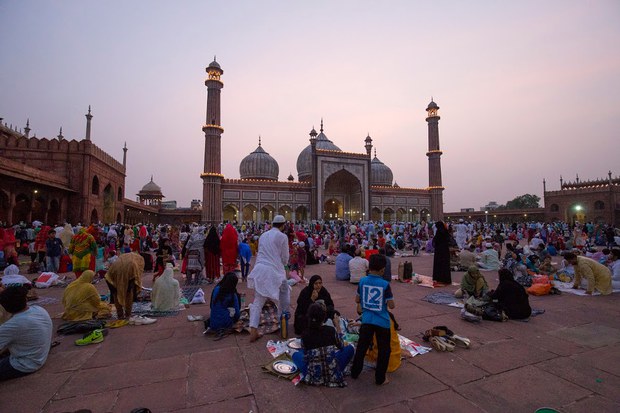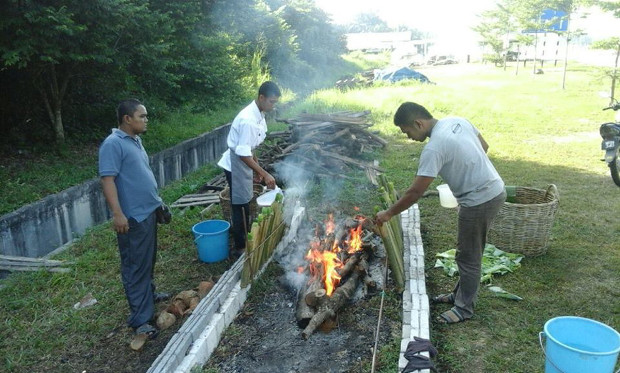Violence Dampens Spirit of Eid Holiday in South, Southeast Asia
2016.07.05
 Indian Muslims gather in the main courtyard of the Jama Masjid in old Delhi, India, to break their fast after offering evening prayers, July 4, 2016.
Indian Muslims gather in the main courtyard of the Jama Masjid in old Delhi, India, to break their fast after offering evening prayers, July 4, 2016.
Millions of Muslims across South and Southeast Asia this week will observe the Eid-ul-Fitr holiday, but Islamic State-linked attacks in Bangladesh, Indonesia and Malaysia and deadly violence in southern Thailand have marred the final days of their Ramadan fasting season.
In Bangladesh, members of the Muslim majority are reeling from a terrorist attack at a Dhaka restaurant on July 1 and 2, which was claimed by IS and resulted in the killings of at least 20 hostages from five countries and two senior policemen.
“This is painful for all Bangladeshis to celebrate our biggest religious festival bearing the memory of the barbaric killings,” Bangladeshi businessman and Dhaka resident Kamal Ahmed told BenarNews on Tuesday.
Minhaz, a shopkeeper at a market in Dhaka's Pallabi area, said that his business had suffered as a result of the attack.
“The terrorist attack has made the people afraid to shop. We are passing very bad days. The terrorists have dampened our festival," Minhaz told BenarNews.
‘Allah’s way’
In Delhi, Tariq Anwar was distributing food inside the Indian capital’s iconic Jama Masjid (mosque), where some 5,000 Muslims gathered Monday to break their fast.
During the month of Ramadan, Muslims are encouraged to increase charity or engage in giving out charity, but the memory of deadly attacks claimed by IS over the weekend in Dhaka and Baghdad, Iraq, were on his mind.
“I have even got my Hindu friends to come and help. It is necessary to give out a message of friendship and peace at times like this when there is so much violence” Anwar told BenarNews, referring to those attacks.
“This is Allah’s way of teaching us discipline and bringing us closer to his message of abstinence, and I hope the ones who have misinterpreted the Quran and are killing innocents in its name take it as Allah’s message to them,” Syed Ansari, the gatekeeper at the mosque, told BenarNews.
Meanwhile, Muslims in Malaysia had just received confirmation from their nation’s police chief that IS was behind a grenade attack which injured eight people at a nightclub near Kuala Lumpur on June 28.
And in Indonesia on Tuesday, a suicide bomber blew himself up outside a police station in Central Java, injuring an officer in an attack that local authorities said was linked to Islamic State.
Elsewhere, Thailand’s predominantly Muslim Deep South, which has been in the throes of a separatist insurgency that has claimed more than 6,500 lives since 2004, was rocked during the month of Ramadan with the killings of at least 17 people and incidents that injured another 25.
Open house
Throughout South and Southeast Asia, Muslims said they were expecting a low-key celebration of Eid.
In preparation for Eid festivities, people buy new clothes and offer special prayers in the morning. Special dishes are prepared for relatives, neighbors, friends and strangers alike.
In multi-ethnic and multi-religious Malaysia, Muslim families practice the tradition of Rumah Terbuka (open house), where they open their homes to anyone regardless of religious beliefs. Visitors are treated to an array of food dishes including rendang (a curried beef dish), lemang (glutinous rice cooked in bamboo) and ketupat (rice dumplings).
“I’m excited to celebrate Eid for the first time with my wife. This year we are heading to my hometown in Sepang, Selangor, and then to Johor to visit my in-laws,” Malaysian Mohammad Nur Hidayat Zakaria told BenarNews.
In Indonesia, the country with the world’s largest Muslim population, as many as 20 million Indonesians were cramming into buses, trains and other vehicles during the days leading up to Eid as they headed home as part of a mass exodus known locally as “mudik.”
“The atmosphere is different when you are going home and reunited with your relatives for Lebaran (Eid),” Farah Dewi Velayati, who was traveling with her family by train to Central Java, told BenarNews at Jakarta’s Gambir railway station.

Merchants prepare Malaysia’s favorite Eid dish – lemang (glutinous rice cooked in bamboo) – at Bangi, Selangor, July 3, 2016. [Haireez Azeem Azizi/BenarNews].
In the Thai Deep South, consumers were spending less money on acquiring items for the holiday because of a downturn in the regional economy, local shopkeepers said.
“This year’s atmosphere is very much bearish, unlike last year. Rubber prices faltered and customers have no money to buy new clothes,” shop owner Nihilme Awae told BenarNews.
Prasit Chaikongkiat, a gold trader in Narathiwat province, was also having a hard time selling to customers.
“Gold isn’t selling well this Eid ul-Fitr, the sentiment is very quiet. Last year, it was quite bullish. They had more income so they had purchasing power,” Prasit told BenarNews.

Customers shop for hats in Narathiwat province, July 4, 2016. (Rapee Mama/BenarNews)
Kamran Reza Chowdhury in Dhaka, Kshitij Nagar in Delhi, Tia Asmara in Jakarta, Haireez Azeem Azizi in Kuala Lumpur, and Rapee Mama in Narathiwat, Thailand, contributed to this report.







